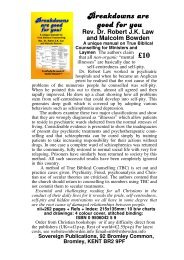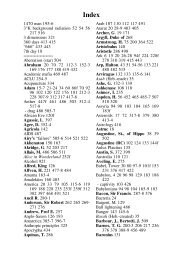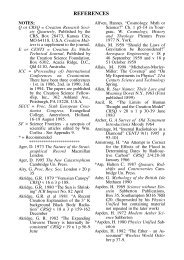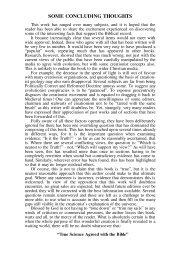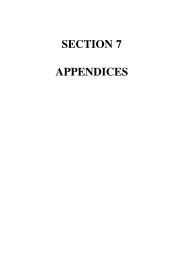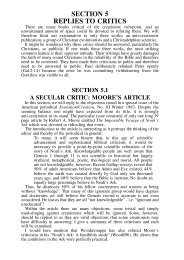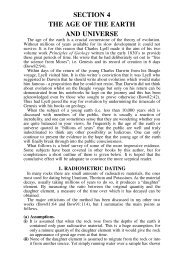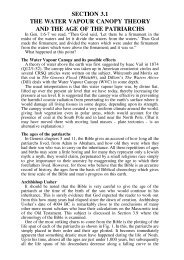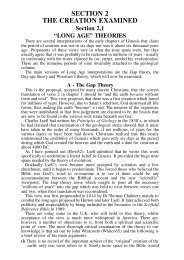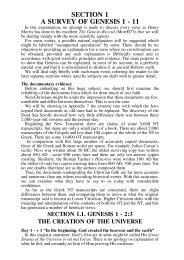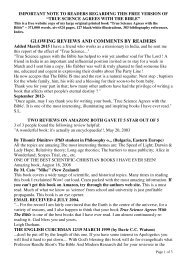TSAWTB Section 6 - Interlude - A Miscellany of Items
True Science Agrees with the Bible, Section 6 - Interlude - A Miscellany of Items (pp. 250-288)
True Science Agrees with the Bible, Section 6 - Interlude - A Miscellany of Items (pp. 250-288)
Create successful ePaper yourself
Turn your PDF publications into a flip-book with our unique Google optimized e-Paper software.
266 <strong>Section</strong> 6 - <strong>Interlude</strong><br />
Summarising these letters, they claim that; Lady Hope’s visit and the service<br />
in the summer house never took place - they were “a fabrication on the part <strong>of</strong><br />
poor Lady Hope”; she incorrectly held to the title <strong>of</strong> Lady Hope due to her<br />
vanity; she was a terrible trial to her second husband, Denny, and when he<br />
discovered that she was running a “Riverside Club” for the poor, he was<br />
shocked, and died from an illness he caught there; she was made bankrupt and<br />
when she left for America, Fegan refused to give her a letter <strong>of</strong> commendation.<br />
These letters are certainly an indictment against Lady Hope, but is should be<br />
noted that they are the only personal criticisms <strong>of</strong> her character. All other<br />
available testimonies spoke most strongly <strong>of</strong> her honesty and sincerity.<br />
Initially, there seemed to be some strange features. For example, why<br />
should Tiffin take copies <strong>of</strong> these letters all the way to Australia in 1957, and<br />
keep them for a further twenty years? Fegan had been “appealed to over and<br />
over again” about Lady Hope but we have only two <strong>of</strong> his letters. Why did<br />
Denny know nothing about his wife’s activities and extravagance? He also<br />
was giving generously to charities for Moore notes that Denny, “having made<br />
his fortune in pork, larded the c<strong>of</strong>fers <strong>of</strong> many evangelical enterprises” (p43).<br />
In view <strong>of</strong> this we tried to check the complex route <strong>of</strong> the letters, but the<br />
outcome was unsatisfactory and unwarrantably tended to deepen the mystery.<br />
The authenticity <strong>of</strong> the letters was proven by a more direct line, for at a late<br />
stage in the investigation, this writer had been contacted about the Fegan<br />
letters by a correspondent who knew Tiffin’s son. We discussed the letters,<br />
and the reason why Tiffin should have had Fegan’s correspondence in<br />
Australia was explained in a note later received from Tiffin’s son. Tiffin had<br />
been asked to write a history <strong>of</strong> the Fegan Homes but the war intervened.<br />
When he emigrated to Australia in 1957 to be with his daughter, he took the<br />
files with him. He eventually wrote, not about the Homes, but a tribute to<br />
Fegan’s excellent work with the destitute boys <strong>of</strong> London. This appeared in a<br />
book entitled Loving and Serving (Tiff).<br />
Fegan and Lady Hope<br />
Moore conjectures that when Fegan fell ill in the summer <strong>of</strong> 1881, he asked<br />
Lady Hope to take over the running <strong>of</strong> his tent meetings. This would then<br />
place her in Downe when she could have visited Darwin.<br />
As the examination continued, it became clear that this link between the two<br />
at Downe at this time did not exist. Fegan never mentions that he had asked<br />
her to take his place, whilst in the Bole letter, Lady Hope specifically states<br />
that she was holding cottage meetings in the area, that Darwin heard <strong>of</strong> this<br />
and invited her to see him (M:87f). At the time, she was living in Beckenham,<br />
only 6 miles (9km) away (M:45). Neither mentions the other. In addition,<br />
Fegan would hardly ask a lady to run these meetings for one writer described<br />
the heat and stench in the tent from the crowds <strong>of</strong> farm workers there<br />
(Rob:13). It was no place to invite Lady Hope.<br />
In an exchange <strong>of</strong> letters with Moore, he explained why he made this link.<br />
Lady Hope had written about an evangelist she called “Felix” to hide his<br />
identity and he considered that “Felix” was a thinly disguised reference to<br />
Fegan - their names being not dissimilar. “Felix”, like Fegan, had worked in<br />
tent meetings in Kent. Secondly, Lady Hope was working in the area <strong>of</strong><br />
Downe. From these slim connections, Moore assumes that Fegan asked her to<br />
take over his meetings.<br />
It eventually became abundantly clear that everything hung upon Lady



